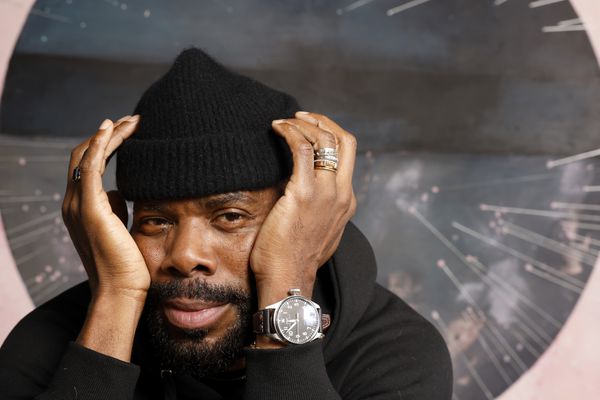
Colman Domingo attends the 26th Annual SAGindie Actors Only Brunch at Sundance at Cafe Terigo on Jan. 22, in Park City, Utah.Fred Hayes/Getty Images
In 2005, prisoners at Sing Sing correctional facility north of New York put on a joyous show called Breakin’ The Mummy’s Code. The comic time-travelling musical revue, made possible through the Rehabilitation Through the Arts, or RTA, program, had singing cowboys and ancient Egyptian zombies.
Clarence “Divine Eye” Maclin played Hamlet, because, well, anything goes in Mummy’s Code. But he also took the role because, having always gravitated toward Shakespeare, he was eager to incorporate the Bard in his performance.
“He saw things from the same vantage point that I see things,” Maclin says on a Zoom group call, expressing a deeply felt appreciation for the playwright’s word play and the existential crisis in Hamlet’s “To be or not to be” monologue.
Shakespeare “really gets into the complexities of man,” adds Colman Domingo, an acting veteran and educator. “This is some complicated stuff. But that’s how we actually feel. Who knows more about the complication, to be honest: It’s men of colour!”
Domingo, who will be receiving the TIFF Tribute Performer Award at this year’s Toronto International Film Festival’s annual fundraising gala, stars opposite Maclin in Sing Sing, which will premiere at the event on Sunday. The tender and uplifting docudrama is partly based on Maclin’s experience with RTA, a program that brings acting workshops and stage shows such as Mummy’s Code to maximum-security prisons, and provides incarcerated people with a space to connect, express themselves and develop life skills – using arts to save lives, as Domingo puts it.
Sing Sing’s premiere follows George Floyd’s murder and the subsequent reckonings of 2020 that inspired more intense conversations surrounding defunding the police and abolishing the prison-industrial complex. The RTA program is just one of many examples of how restorative justice and working toward rehabilitation would be a more humane and beneficial path over carceral punishment. According to the RTA’s website, only 3 per cent of its participants return to prison, compared with the 60-per-cent national average.
“Most of the men involved with programs, where you got to choose to be there, they don’t go back to doing wickedness,” Maclin says. “It’s hard to choose negative, once you know what positive is, once you’ve experienced it.”
Maclin was released from prison more than a decade ago. He has since graduated with a bachelor’s degree in behavioural science, worked in counselling and now runs his own community-outreach program, Successful Steps, where he mentors youth and provides scholarships to give them a leg up. He’s trying to empower people in the community the way the volunteer-run RTA built him up. Maclin recalls the program providing a space in Sing Sing for him to feel human instead of “being treated like 9687997” – his prisoner number, which he says he will never forget.
“The prison guards made me feel as though I’m their livelihood,” Maclin says, drawing from his own experience to hammer home the distinction between restorative and carceral systems.
“I’m their steak on the table. If there’s no prisoners, they don’t get to eat. This is the only thing they know how to do. And they’re going to make sure that I don’t even think about bettering myself to not want to come back here.”
When I had arrived to the Zoom meeting room early, Maclin was already there sprawled out comfortably on a sofa seat in shorts and a T-shirt, doing some side reading but ready to just jump into it. We were discussing the work he does now and how closely Sing Sing hews to his own experience, when Domingo, alongside director Greg Kwedar and writer Clint Bentley, entered the call.
“You just don’t wait for nobody,” Domingo playfully yells out. “No hello. No nothing.”
There’s a warm raucous vibe between Domingo and Maclin, a chemistry immediately felt onscreen in Sing Sing. Domingo, the celebrated stage and screen actor, is also a producer on the film, which he can discuss ahead of TIFF because the independent project has obtained an agreement from the Screen Actors Guild-American Federation of Television and Radio Artists, or SAG-AFTRA, allowing the stars of such titles to participate in festival publicity despite the actors’ strike. He plays Divine G, a fellow RTA performer and mentor who had Maclin’s ear when the latter was a more ruthless presence in Sing Sing.
Maclin plays a version of his younger self, alongside a cast mostly comprised of RTA alumni. In so many scenes, they just seem to be opening up, making themselves vulnerable for the camera, as if the movie broke from docudrama to straight up documentary and is just capturing the RTA workshops in action.
Maclin describes his appreciation for the RTA volunteers, who endured strip searches and other humiliations just to enter the dehumanizing spaces in Sing Sing and share their gift with him.
“When they do get in this room,” he says, “they don’t look at me like I’m the worst thing on this planet. They look at me like I’m a human being and I chose to try to help myself. If I take two steps toward them, they’ll take two steps toward me. That’s all I can ever ask for.”
Domingo believes “this will save us, actually,” speaking not only for the participants who benefit from the RTA program but also the audiences willing to see past the barbed wire and prison bars and connect with their fellow man.
“There’s a chance for redemption, a chance for healing, and – of course with accountability – a chance to live, to love, to create, like everybody else, because it’s human. That’s the spirit of this film.”
Sing Sing screens at TIFF Sept. 10; Royal Alex Theatre, and Sept. 11, Scotiabank (tiff.net)
Special to The Globe and Mail
This post was originally published on this site be sure to check out more of their content.






